5 Natural Strategies to Support Healthy Digestion
As a Chinese medicine practitioner and nutrition teacher, I’m a firm believer in what is called the “Earth School”.
The Earth School was founded about 1000 years ago by a physician named Li Dong-Yuan, who observed that most diseases of the mind and body are rooted in the digestive tract.
Fast-forward to the 21st century, and science is backing his claim up.
Research on the microbiome is still in its infancy, but in just a few years gut health has already been linked to immune system function, inflammation, nutrient absorption, and mental health. 1, 2, 3
And when there’s an imbalance in the microbiome, evidence is showing a link to debilitating and life-threatening diseases like Parkinson’s, Alzheimer’s, depression, ADHD, and various forms of cancer. 4, 5, 6, 7, 8
So when a patient comes to me in clinic, or a coaching client works with me online, some of the first questions I ask are about digestion.
Learn more about Holistic Health and Wellness Coaching
Healthy digestion means having 1-2 well-formed bowel movements every day, with no undigested food, straining, gas, bloating, acid reflux, or abdominal discomfort.
Anything else, and I know something is up.
Frequent loose stools usually tell me that there is too much dampness in their system, and as a result their body is having a hard time breaking down and absorbing nutrients. This is typical in people who are fatigued, overworked, and/or worry a lot.
Someone who tends more toward constipation, on the other hand, may have too much dryness in their system. These people may have a hard time processing emotions, and often have sensitive lungs as well.
If a patient tells me that they alternate between loose stools and constipation, my first thought is that they’re overwhelmed by stress and it’s impacting their physiology, a pattern that is recognized as “Liver overacting on Spleen” in Chinese medicine.
Acid reflux usually happens in people with too much heat in their system, which is why it often goes hand-in-hand with an explosive temper, rashes, and other signs of inflammation.
Those are just some of the possible patterns.
It has to be mentioned that any of these patterns can be caused by eating too many industrially-produced edible substances (aka ultra-processed foods,) but imbalances also arise when you eat foods that you’re sensitive to, or that aren’t suited to your personal constitution.
Read more: Ultra-processed foods and mental health.
To figure out exactly what’s going on, I generally have to ask a few more follow-up questions before we can make a personalized plan, but there are 5 strategies to support healthy digestion that I recommend to almost everyone.
Because all health is rooted in the digestive tract, these strategies can help you restore, build, and maintain vitality whether you’re dealing with chronic disease, hoping to crawl out of anxiety and depression, are struggling with PMS and fertility, or just want clearer skin (or anything else!)
Healthy digestion is the foundation of mind-body health.
It should be considered the first line of treatment for all dis-ease, as well as an essential component in dis-ease prevention.
Here are 5 Natural Strategies to Support Healthy Digestion
1. Drink warm fresh ginger tea
With just the right amount of spice and warmth, fresh ginger is a key ingredient in most Chinese herbal formulas that target digestion, and Western herbalists love it, too.
In her book, Herbal Medicine From the Heart of the Earth, Dr. Sharol Marie Tilgner explains that fresh ginger “has been shown increase bile secretions and increase the activity of digestive enzymes,” as well as being an effective remedy against nausea, inflammation, neuropathy, and even tumors. 9, 10
To make fresh ginger tea:
Chop up about 2 inches of fresh ginger root and add to a couple cups of water, bring to a boil, then simmer for 20-30 minutes.
You can sweeten this with raw honey or add some fresh nut milk to it, or, if the decoction is too strong for you, just add some fresh ginger to boiled water and let steep covered for 10 minutes.
Ayurvedic expert Dr. Vasant Lad also recommends chewing on fresh ginger root to stimulate appetite. 11
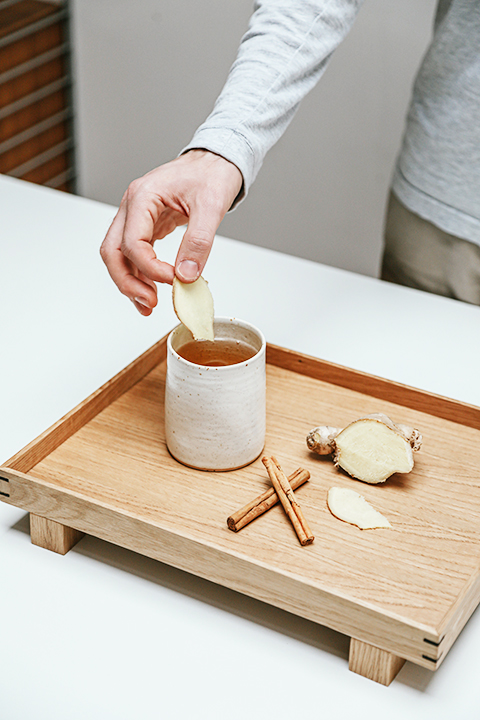
2. Presoak (and/or sprout and/or ferment) most whole grains, beans, and other seed foods for healthy digestion
Seeds, beans, legumes, nuts, and whole grains (what I’m going to call “seed-foods” here,) contain phytic acid, which is how many seeds store phosphorus.
Phytic acid may have some protective effects, but it also blocks your body’s ability to absorb zinc, iron, calcium, and other essential minerals. 12
They also contain oligosaccharides, which can make them hard to digest and cause gas in many people. 13
Soaking, sprouting, and fermenting seed-foods removes some the phytic acid and oligosaccharides, which supports healthy digestion by making it easier for your body to break the foods down and extract the nutrients it needs.
Some seed-foods like quinoa, cashews, and pistachios are to soft and don’t do well if soaked for too long.
But presoaking is definitely a strategy to try with harder seed-foods if you notice gas, bloating, abdominal discomfort, or other digestive issues after eating seed-foods.
And if you’re worried about eliminating the protective aspects of phytic acid, don’t, because you won’t be eliminating all of it.
To soak whole grains and beans:
Immerse them in water for 12-24 hours, then allow them to sit in a strainer or a sprouting jar (where there is good ventilation) and rinse every 12 hours until you’re ready to use them.
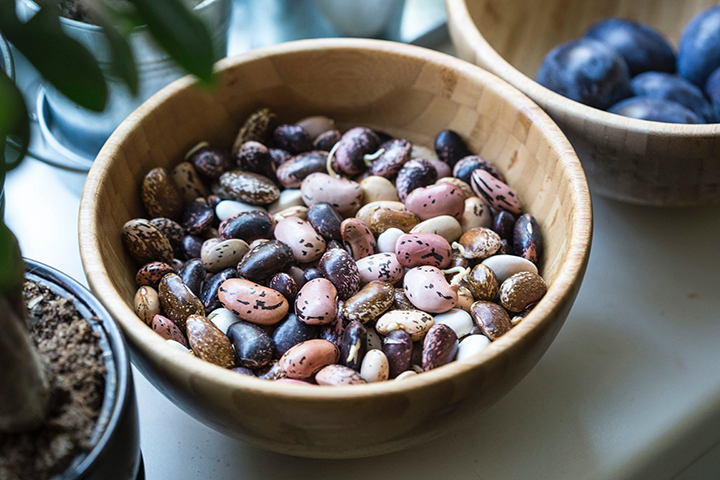
Depending on the temperature in your kitchen, you can usually keep this going for 2-5 days and allow the seeds to sprout, but even just an overnight soak will have noticeable benefits for your digestion.
And if you don’t want to manage a lot of things in your kitchen, some seed-foods can be bought pre-sprouted, so keep your eye out for them at the grocery store.
Note that sprouts should never be consumed raw as they can cause food poisoning, always steam or fully cook sprouted foods.
3. Support healthy digestion with naturally sweet root vegetables and winter squash
In Chinese medicine, the Stomach and Spleen (the latter is probably a misnomer for the pancreas) are the organs associated with the Earth Phase-Element. And Earth is considered to be both the center of physiological digestion and the symbolic ability to digest life.
The colors associated with the Earth Phase-Element are the earthy colors of yellow, orange, and brown, and the flavor association is sweet, so earth-colored sweet foods—when eaten as part of a balanced diet—also support healthy digestion.
The first flavor babies are attracted to is the sweet flavor, because sweet foods are almost always safe to eat (compared to, for example, bitter plants which are often poisonous or, if edible, can only be consumed in moderation.)
Of course, our natural affinity for sweet foods has been exploited by processed food companies, who now add excessive amounts of sugar to their products in order to cover up the taste of industrially produced preservatives, emulsifiers, and the like—and to make their products more addictive so you buy more. But artificial sweetness is not what we’re talking about here.
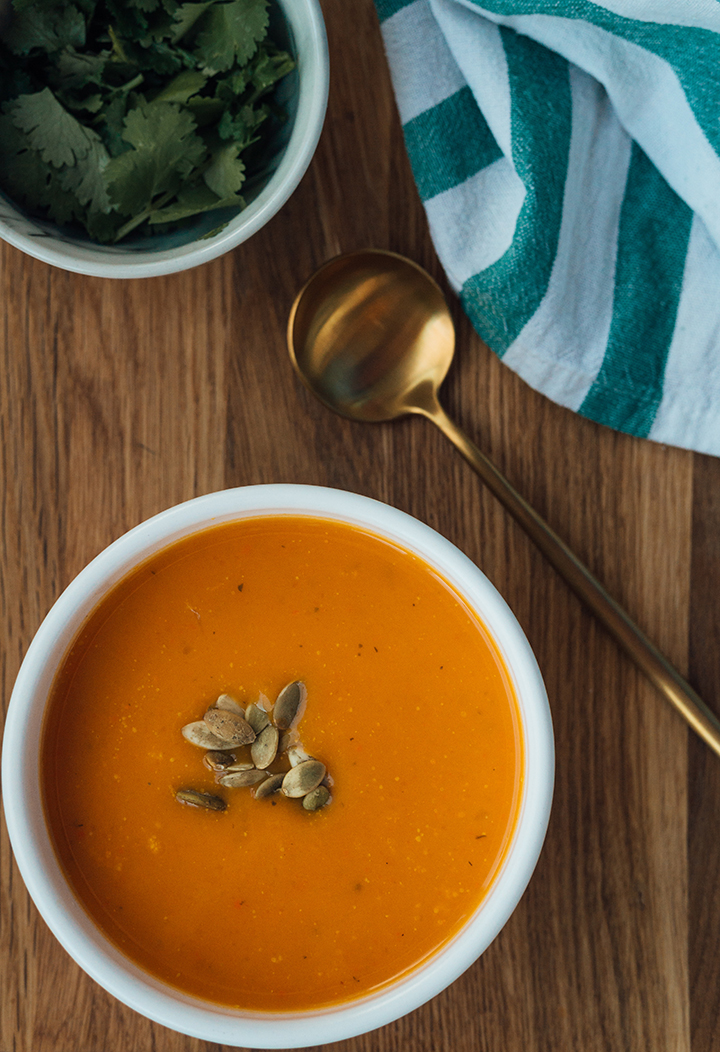
Naturally sweet foods are some of the most nourishing foods you can choose.
Root vegetables and winter squash, in particular, are easy for your body to break down and absorb, and are soothing to the digestive tract, especially when they’re cooked.
When a patient comes to me with any form of digestive issue, the first thing I recommend is that they eat more root vegetables, and, in the fall and winter, also winter squash.
Depending on their body’s constitution, most people benefit from including root vegetable soups and stews in their meal plan at least a few times a week.
If you tend to have a thick white coat on your tongue and frequent loose stools, you may want to see what happens if you alternate soupy foods with drier alternatives like roasted root veggies.
It’s also helpful to include aromatic spices like ginger (fresh or dried), turmeric, cumin, coriander, black pepper, rosemary, clove, etc. for a more balanced flavor profile.
For very weak, sick, overexerted/burnt-out people, or those with little appetite, I always recommend making kitchari or congee using these ingredients.
4. Include pre and probiotic foods in your weekly rotation
With gut health being the foundation of all health and wellbeing, you want to regularly refurbish your microbiome with good bacteria, and then feed them so they want to stick around.
This is where pre and probiotic foods come in.
Probiotic foods are fermented foods like sauerkraut, tempeh, and yogurt, which are rich in healthy microbes. Prebiotic foods are the fiber-rich ingredients like alliums and Jerusalem artichoke that these microbes like to eat.
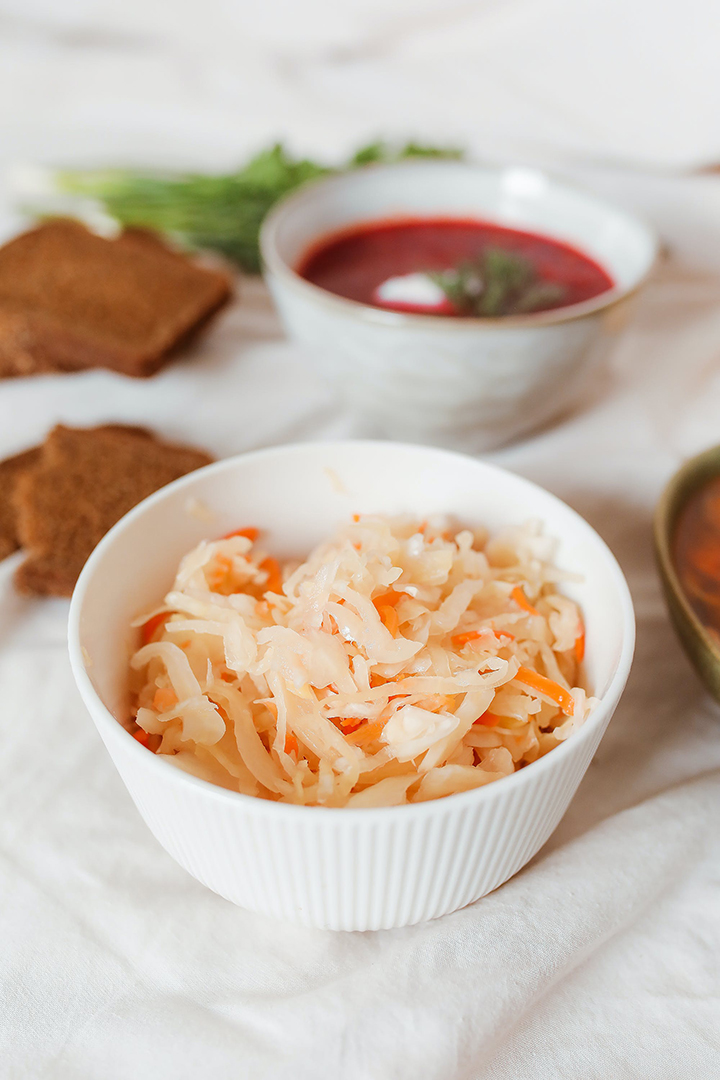
Learn more here: Gut Healthy Foods: Prebiotic vs. Probiotic, what’s the difference?
Most people benefit from eating pre and probiotic foods 3-5x/week, but some people, like those with IBS or leaky gut, may be more sensitive to these ingredients. If this is you, start with very small portions less often, take probiotics, avoid ultra-processed foods, and think about working with a holistic health practitioner to identify the strategies that will help you most.
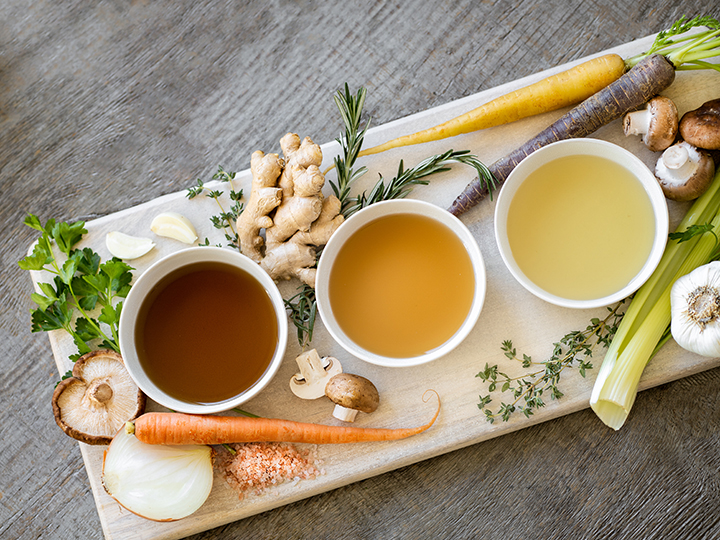
5. Make broth and stock
Homemade broth and stocks are both a great way to use up vegetable scraps (and, if you eat meat, animal parts that aren’t often used,) while simultaneously increasing the nutrient profile of your food.
Studies suggest that bone broth, in particular, may have anti-inflammatory effects in addition to giving your body a boost in collagen and other nutrients that are often lacking in the modern diet. 14
Vegetarian broth is also great, filled with water-soluble vitamins that go straight into your bloodstream with little effort needed from your digestive tract.
Broth and stock can be used to add flavor and increase the nutrient profile of grains, sauces, and other meals, or you can just drink a cup on its own as nourishing a midday snack.
These 5 strategies for healthy digestion are foundational medicine for all ailments.
For some people, making just a few small changes to their diet can completely resolve their physical pain and psycho-emotional suffering.
Others may need some extra support in the form of herbal prescriptions, additional personalized dietary modifications, mind-body exercises and practices, and hands-on treatments.
Either way, these 5 strategies are the place to start.
Next steps: Click here to learn more about how you can support your own health holistically, and book your first 1-on-1 session with Katerina.





